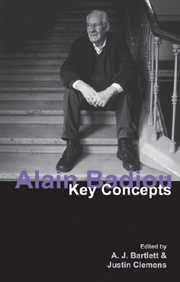Book contents
- Frontmatter
- Contents
- Contributors
- Acknowledgements
- Abbreviations
- Miscellaneous Frontmatter
- Introduction: Badiou's form
- 1 Biography and early works
- PART I THE FOUNDATIONS OF BADIOU'S THOUGHT
- PART II BADIOU'S KEY CONCEPTS OR “CONDITIONS”
- PART III BADIOU'S ENGAGEMENT WITH KEY PHILOSOPHERS
- 10 Plato
- 11 Spinoza
- 12 Kant
- 13 Hegel
- 14 Heidegger
- 15 Lacan
- 16 Deleuze
- 17 New directions
- Afterword: Badiou's futures
- Bibliography
- Index
17 - New directions
from PART III - BADIOU'S ENGAGEMENT WITH KEY PHILOSOPHERS
- Frontmatter
- Contents
- Contributors
- Acknowledgements
- Abbreviations
- Miscellaneous Frontmatter
- Introduction: Badiou's form
- 1 Biography and early works
- PART I THE FOUNDATIONS OF BADIOU'S THOUGHT
- PART II BADIOU'S KEY CONCEPTS OR “CONDITIONS”
- PART III BADIOU'S ENGAGEMENT WITH KEY PHILOSOPHERS
- 10 Plato
- 11 Spinoza
- 12 Kant
- 13 Hegel
- 14 Heidegger
- 15 Lacan
- 16 Deleuze
- 17 New directions
- Afterword: Badiou's futures
- Bibliography
- Index
Summary
And when I speak of the other division of the intelligible, you will understand me to speak of that other sort of knowledge which reason herself attains by the power of the dialectic, using the hypotheses not as first principles, but only as hypotheses – that is to say, as steps and points of departure into a world which is above hypotheses …
(Plato, Republic VI, 511)Prove all things; hold fast that which is good.
(Paul, First letter to the Thessalonians, 5:21)Let a hundred flowers blossom – I think we should go on doing that.
(Mao Tsetung, “Talks at a Conference of Secretaries of Provincial, Municipal and Autonomous Region Party Committees,” in Selected Works, vol. 5)What does Badiou's philosophy offer the philosopher? He has developed a compelling array of concepts that militants, whether political or scientific, amorous or artistic, can apply to their disciplines in order to see them in new light. Crucially, the utility of Badiou's philosophy for each of these practices, scholarly and militant, owes much to its foundation on a series of axiomatic decisions. The abruptness of its axiomatic base grants the scholar a freedom to examine it as self-contained system, logically isolated from its exterior, yet also gives it its remarkable mobility, letting it be transported and applied to domains quite foreign to those of its initial construction.
This coupling of autonomy and mobility is precisely what the pioneers of the axiomatic method sought through the axiomatization and formalization of mathematics.
- Type
- Chapter
- Information
- Alain BadiouKey Concepts, pp. 176 - 184Publisher: Acumen PublishingPrint publication year: 2010



